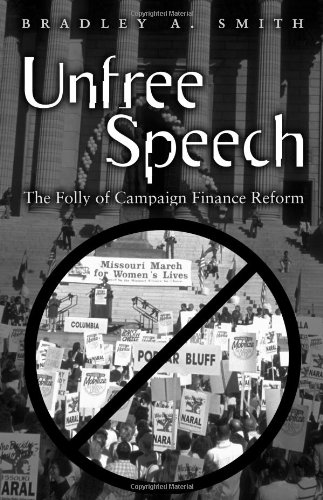
Unfree Speech
The Folly of Campaign Finance Reform
کتاب های مرتبط
- اطلاعات
- نقد و بررسی
- دیدگاه کاربران
نقد و بررسی

February 26, 2001
Law professor and Federal Election Commission member Smith does not beat around the bush: "Almost everything the American people know, or think they know, about campaign finance reform is wrong," and he proceeds to say why in a work that is both enlightening and entertaining. The popular perception of campaign financing is that of a corrupt system in which a few wealthy contributors have undue influence upon the decisions of lawmakers. In fact, Smith goes to great lengths to show, the system works pretty well. Comparatively, he says, not that much is really spent on campaigns—Americans spend more on both potato chips and Barbie dolls—and there is little if any proof that the system does in fact corrupt or privilege one group's interests over those of others. But reformers must reform, and in doing so, Smith says, they have made matters worse. Reform has tended to favor incumbents and wealthy candidates, to discourage grassroots organizing, to turn campaign discussion into a mush of platitudes. And with every reform failure the reformers must add another reform, until campaign finance regulation becomes a "mosh pit" of confusion and cross-purposes. This might all be funny were it not, Smith contends, that campaign finance reform is simply unconstitutional—he argues that it threatens the freedom of speech guaranteed by the First Amendment. To say the least, there are many who will disagree with Smith's findings and conclusions. But this is a marvelous contrarian view: moderate in tone, elegant in language, clever in argument. (Mar.)Forecast: Could a book be more timely? If Princeton promotes it vigorously, it should generate some controversy among pundits and sell honorably well.

March 15, 2001
In early 2000, Smith, a professor at Capital University Law School in Columbus, Ohio, was nominated to a six-year term on the Federal Election Commission. That's significant because Smith is a notable academic supporter of the notion that money equals speech, the position partially espoused by the U.S. Supreme Court in " Buckley "v." Valeo" and aggressively presented by some Republicans in opposing current campaign finance reform legislation. His book explores the history (and unintended consequences) of previous campaign finance regulation, discusses constitutional issues, and analyzes future alternatives. At the center of Smith's argument is a utilitarian analysis of the behavior of candidates, contributors, and voters. He challenges reformers' assumptions that too much money is spent on campaigns, giant contributions drown out the voice of the people, spending determines results, and campaign money corrupts Congress. Although more sympathetic to disclosure than to contribution limits, Smith is ultimately a First Amendment absolutist, urging that any limitation on campaign contributions restricts free speech. Both opponents and supporters of McCain-Feingold should spend some time with this thoughtful study.(Reprinted with permission of Booklist, copyright 2001, American Library Association.)

























دیدگاه کاربران